
We kindly inform you that, as long as the subject affiliation of our 300.000+ articles is in progress, you might get unsufficient or no results on your third level or second level search. In this case, please broaden your search criteria.

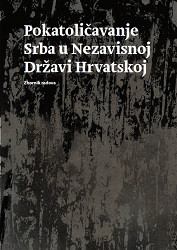
Jugoslovenska država je 1918. stvorena na liberalnim načelima, među njima i na načelu slobode veroispovesti i verske ravnopravnosti, baštineći tradiciju Kraljevine Srbije. To načelo je prihvaćeno tokom pregovora o uređenju buduće države sredinom 1917. i uneseno u Ustav nove države. Uvođenje liberalnog građanskog uređenja u jugoslovenskoj državi je omogućilo polet hrvatskog nacionalističkog pokreta oličenog u Hrvatskoj seljačkoj stranci. Rimokatolička crkva (RKC) nije bila zadovoljna svojim položajem u jugoslovenskoj državi. Umesto privilegovanog položaja u dvojnoj monarhiji, ona je posle 1918. bila jedna od priznatih veroispovesti u državi u kojoj je vladar bio pravoslavne vere. Izvestan broj rimokatolika je iz raznih razloga (iz ubeđenja, zbog braka, iz karijerističkih pobuda) prihvatio pravoslavnu veru. Velikodostojnici RKC su izuzetno preuveličavali te brojeve nastojeći i time da dokažu da je ona u neravnopravnom položaju u odnosu na Srpsku pravoslavnu crkvu (SPC). Gašenje političke aktivnosti posle proglašenja diktature kralja Aleksandra januara 1929. otvorilo je prostor RKC da preko masovnih organizacija Katoličke akcije i Križara organizuje jednu od najsnažnijih opozicija režimu. [...]
More...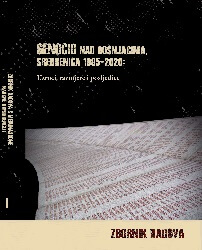
Genocid, genocid, genocid! Tom prividno poznatom riječju imenovani su progoni i ubijanja bosanskih muslimana u Srebrenici 1995. godine. Za to djelo osuđeno je više pojedinaca koji su ga domislili, podstakli i/ili proveli. Tom riječju, koju su izrekli suci, koju potomci i srodnici ubijenih ponavljaju kao molitvenu utjehu, užasnuta i ustrašena većina više je anestezirana negoli utješena. Ali riječi nemaju značenja izvan rečenice. Kada su im nametana korištenja u izdvojenosti, one postaju plastične. Čine se neprijeporno shvatljivim, a ipak su sve dalje od tog što njihovi korisnici hoće u žalosti i patnji, u ljubavi i mržnji te u nastojanjima da prežive i budu sretni. [...]
More...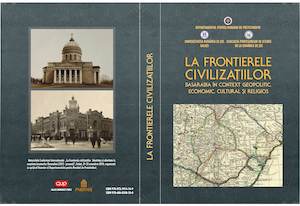
Intenţia noastră în cadrul acestui studiu este aceea de a analiza modul în care s‑a raportat clasa politică românească în perioada 1875‑1878 la ceea ce ar putea fi numit „problema sudului Basarabiei”, adică a judeţelor Cahul, Ismail şi Bolgrad revenite în trupul Moldovei prin Congresul de la Paris din 1856 şi pierdute de către statul român în urma reuniunii internaționale de la Berlin (1878).
More...
Actul unirii Basarabiei cu România implică atât o discuție istorică, cât şi una politică. Intersectarea istorică dintre Rusia şi România este una dintre cele mai complexe din Estul Europei. Practic, în cadrul relațiilor bilaterale regăsim episoade pe care le putem caracteriza drept pagini albe, fără a exagera. Problema anexării Basarabiei în 1812, cea a Tezaurului de la Moscova sau a notelor ultimative din iunie 1940 sunt câteva dintre cele mai importante în acest sens. Pornind de la aceste premise, vom încerca să analizăm poziția diplomației franceze în cadrul dezbaterilor din 1920, observând încă de la început că susținerea Franței a fost una continuă, dar amplitudinea ei oscilantă. Demersul nostru se bazează, în mare parte, pe documentele diplomatice franceze, iar inițiativa nu se vrea una exhaustivă. De altfel, modesta încercare de față îşi propune nu aducerea unor informații absolut noi, atitudinea diplomației franceze fiind cunoscută 8 , ci mai ales, o viziune proprie
More...
Realizarea unirii din 1918, un mare succes pentru naţiunea română, favorizat şi de conjunctura internaţională care a dus la prăbuşirea imperiilor multinaţionale din Europa, nu a însemnat, totuşi, şi o stabilizare a situaţiei politice a României, în context continental. Ataşându-şi noile provincii, Vechiul Regat era obligat să ducă o campanie politică şi diplomatică permanentă la nivel internaţional, pentru a obţine conservarea graniţelor şi păstrarea unui statu-quo teritorial favorabil, în Europa de Est. Acest lucru nu era nicidecum facil, în condiţiile în care ţările vecine, care pierduseră regiuni întregi la finalul războiului, nu se puteau abţine de la strategii revizioniste şi de la acţiuni provocatoare, care ţineau într-o alertă permanentă statul român. Din acest motiv, Bucureştiul trebuia să-şi consolideze, în continuare, legăturile cu foştii aliaţi, şi pentru a-i convinge că unirea „a corespuns unor puternice realităţi istorice şi etno-politice care pătrunseseră în conştiinţa tuturor.
More...
După cum se poate observa, interesul SUA pentru potenţialele evoluţii de la frontiera răsăriteană a României (şi nu numai, analizele de la începutul războiului fiind ample şi fac referire la complexitatea vieţii politice interne şi la opţiunile de politică externă) a fost unul aproape permanent, pentru perioada de început a războiului (1939 – 1940). Mai mult, convingerile exprimate au fost mult mai aproape de realitatea prezentă, uneori anticipând, fără a greşi, evoluţii viitoare. Îndrăznim să apreciem că opiniile formulate, în rapoartele lor, de diplomaţii americani de la Bucureşti, Moscova sau de membri ai Departamentului de Stat au dat dovadă de o luciditate sporită faţă de cele ale autorităţilor române cu care, într-un moment sau altul, s-a realizat un schimb de vederi cu privire la situaţia acelui moment.
More...
Atunci când, arareori, istoriografia – fie că ne referim la cea românească postcomunistă, finlandeză sau occidentală – s-a oprit asupra cazului Finlandei şi al României în perioada celui de-al Doilea Război Mondial, aceasta a remarcat faptul că cele două state au fost victime ale Pactului Ribbentrop-Molotov, s-au văzut obligate la dureroase cesiuni teritoriale, motiv pentru care acestea au devenit „camarazi de arme” în Războiul din Răsărit (1941-1944).
More...
După eliberarea Basarabiei (26 iulie 1941) de către armatele româno-germane de sub ocupaţia sovietică de un an de zile, structurile Serviciului Special de Informaţii (S.S.I.), împreună cu celelalte organe ale statului, s-au reinstalat în teritoriul dintre Prut şi Nistru.
More...
Pactul dintre Hitler şi Stalin, semnat la 23 august 1939, stipula într-un protocol secret interesele sovietice de a anexa Țările Baltice, estul Poloniei şi estul României – teritorii care niciodată nu i-au aparţinut. La 28 iunie 1940, Armata Roşie a trecut Nistrul ocupând Basarabia, nordul Bucovinei şi ţinutul Herţa. Ceva mai târziu, la 2 august, ignorând interesele populaţiei băştinaşe şi încălcând legislaţia internaţională, chiar şi pe cea sovietică, o parte din teritoriul Basarabiei – şase judeţe: Bălţi, Tighina, Chişinău, Cahul, Orhei şi Soroca – şi şase din cele 13 raioane ale R.A.S.S.M. – Tiraspol, Grigoriopol, Dubăsari, Camenca, Râbniţa şi Slobozia – sunt incluse forţat în componenţa Republicii Sovietice Socialiste Moldoveneşti. În acelaşi timp, teritoriile româneşti din nordul Bucovinei, ţinutului Herţa, nordului şi sudului Basarabiei, pe baza aceluiaşi scenariu, sunt incluse în componenţa Republicii Sovietice Socialiste Ucrainene.
More...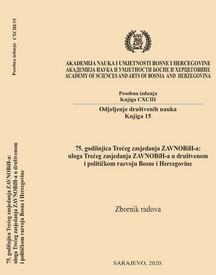
The transcripts from Sarajevan State Anti-fascist Council for the National Liberation of Bosnia and Herzegovina session witness the dedication of its councilors towards the present. This implicates an intense connection of Bosnia and Herzegovina with the Yugoslavian geopolitical imaginary (B&H as a homeland within a homeland). At the same time, it develops a discourse – an indisputable one – of a unified Bosnia as a political community being built as a state. The third ZAVNOBiH session, unfortunately, did not develop enough strength to deepen and pull the true levers of the state citizenship imagined within the earlier grand freedom charter from Sanski Most. However, the epochal success of the Sarajevo session lies in its development of a territorial identity of Bosnia and Herzegovina as a socially, economically and culturally conscious space. This success is an epochal success – especially when compared with B&H’s current arrested development. Today, this country is left without its unified space, reduced to a mere territorial sum. It is also deprived of its unique trinational togetherness, reduced to a nationalistic negation of the ZAVNOBIH itself, a translation of the “3 in 1” formula into a “big, acephalous nothing”. The fact that the third ZAVNOBIH session was held in Sarajevo witnesses the building of Bosnia from the state of war to the state of peace as a political community – from the periphery of a just war (Bosnian Krajina) towards the center (Sarajevo), which used to be an extremely important symbolic and political message about its core state community. This community grew as a natural, decentralized entity, but with a clear, leading, all encompassing topos from a place (that is not Belgrade, nor Zagreb) where its unique plural identity is forged. Our only option is to proceed with forging.
More...
During the Second World War, the People’s Liberation Movement (PLM) in Yugoslavia had several goals, of which the anti-fascist fight and liberation of the country stood out, as well as the building of a new democratic people’s government, i.e. a new socio-political system. In order to understand this, one must keep in mind the historical outcomes and activities of which stand out: (1) letters from the advanced Bosnian student youth of 1937, 1938 and 1939; (2) the leftist magazine „Putokazi“ from Zagreb, which was published for three years (1937, 1938 and 1939), with a total of 13 issues, edited by Skender Kulenović and Hasan Kikić, Zijo Dizdarević, Hamid Dizdar and Safet Krupić. The editor-in-chief was Šukrija Huskić and (3) the Fifth National Conference of the Communist Party of Yugoslavia in Zagreb from 19 to 23 October 1940, which paid special attention to Bosnia and Herzegovina. Understanding the anti-fascist fight of the PLM as a permanent civilizational-existential constant, in which all peoples and nationalities led by the PLM took part, the authors focus on building a new people’s democratic government. At the same time, they emphasize that the center of the PLM was in BiH, especially in Bosnian Krajina, where historical key events were held (two sessions of the National Anti-Fascist Council of People’s Liberation of Bosnia and Herzegovina - ZAVNOBiH in 1943 - in Mrkonjić Grad and 1944 in Sanski Most and two sessions of the Anti-Fascist Council of the People’s Liberation of Yugoslavia - AVNOJ - in 1942 in Bihać and in 1943 in Jajce). Thus, the development of the PLM and the building of new government in BiH were directly correlated. Eminent scientists (such as academician Enver Redžić) asses that these historical events happened under the pressure of successful development of the PLM and that they would have happened without the instructions of the PLM leadership, which does not question their role at all.
More...
During socialist Yugoslavia, in Bosnian-Herzegovinian historiography, the emancipation of women was associated with her participation in the People’s Liberation Struggle. From 1942, when the organization of the Anti-Fascist Women’s Front of Yugoslavia was formally established, until 1953, when it was abolished at the Fourth Congress, this mass organization was more or less, and even under the full influence of the Communist Party of Yugoslavia, depending on political circumstances. Although this women’s organization was publicly thanked for its successful work, with the constant remark that more women and better results are expected, prominent women members, as well as women fighters and women members of the Party did not participate in the highest emerging government institution during the war, as well as postwar period. The promises of the revolutionary government during the war time were fulfilled immediately after the war by constitutional and legal solutions. Women in socialist Yugoslavia received active and passive voting rights, equal pay with men for equal work, equality in family and inheritance law, the right to divorce, the right to share marital property, the right to protection of illegitimate children, paid maternity leave, the right to guardianship, etc., with tendency to expend legislation in favor of women. However, equality between women and men was more based on legislation and less on a fundamental change in female-male relations in everyday life because it was difficult to change the stereotype of the women as a caring mother, hardworking housewife and exemplary worker – so women did not have much time to socio-political activities. In addition, women were not brave enough to get rid of the imposed restrictions.
More...
ZAVNOBiH is an expression of the desire of the people of Bosnia and Herzegovina to live in freedom, as their own, in a community in which decisions about their lives will not be made by other but by themselves only. And that is exactly why ZAVNOBiH could have been the instigator of both the nationwide gathering under the same flag and the nationwide enthusiasm, both in the whirlwinds of the National Liberation War and after it. Actually, with the third session, ZAVNOBiH ended its life by transferring its competencies to peacetime government institutions. However, the spirit of enthusiasm it produced did not diminish in these institutions either, at least for the first twenty or so post-war years. In support of this, after all, there are the statistics - the achieved rates of economic growth, according to which Yugoslavia, and with it Bosnia and Herzegovina, of course, was at the very top of the world, then the achieved rates of employment, trends in gross domestic product, achievements in education and health and many other indicators. Have the people of Bosnia and Herzegovina forgotten the values on the wings of which the war-torn country of the 1940s and 1950s was rebuilt, from which youth work actions were fed, which radiated love instead of hatred? On an emotional level, I’m not ready to believe that. In reality, however, it is possible to mark the details that most seriously warn - not only today but all the years of Bosnia and Herzegovina’s social and political transition.
More...
The crucial task of the Third Assembly of the Anti-Fascist Council of the People’s Liberation of Bosnia and Herzegovina (ZAVNOBiH) was to create a framework for the establishment of further development of Bosnia and Herzegovina as federal Unit. This assembly resulted in the important acts for Bosnia and Herzegovina as a member of Yugoslav Federation such as the constitution of the first Peoples Assembly, and the Law on People’s Government based on which, two days later, April 28, 1945. the first People’s Government had been formed, etc. However, one important question remains – what kind of federation was Yugoslav socialist one? Socialist Yugoslavia looked after Soviet federation as its model which, in scientific literature, could best be described as ethnoterritorial federalism. So Yugoslavia was simultaneously understood as the federation of its peoples and its republics in which its peoples practiced their sovereign rights. Based on this double approach, the two interpretations of Yugoslav federalism developed in time: the unitary-centrist one which considered the borders of republics as administrative, and the republican-federalist one which considered republics as sovereign national states. There was also a third variant of socialist federalism developed during 1970’s – the socialist self-management federalism which delegated the political subjectivity down to the level of individual enterprises and local communities designed to undermine nationalist interpretation, but it failed to be implemented due to already strengthened etatisms. These federalist dilemmas were especially fatal for Bosnia and Herzegovina which could not have been constituted as national republic-state.
More...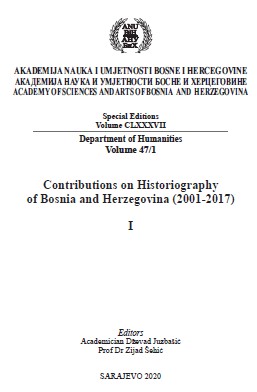
The periods of deep political and social quakes always bring reconsideration and rearrangement of the events that happened in the past. Disappearance of ideological paradigm, changes in global politics and epochal consciousness affected the return of the pre-socialist past, its romantization and idealization, as well as revisionist change of social determinants that were used for historical interpretations in post-socialist countries with the intense action of politics, nationalism and history in their historiographies. Even the bigger historiographies like Russian, are not immune from political pressure in relation to its own history, and histories of other countries and nations. There are many differences between the Soviet and the modern Russian historiography, as well as their forms. Due to the wish to control history, the international and class principle gave its place to the more active, national one, with the renewal of its identity that is clean from communist influence. Interests and politics of superpowers leave a huge mark in the history of the Balkan nations. Political disputes and positioning affect the historiographies and they play a big role in determining the topics that need to be researched. Dissolution of Yugoslavia and the emergence of new post-Yugoslav states on the European political map worsened the efforts of Russian historians in analyzing and researching their past and modernity. The increase of Russian interest in researching the history of Bosnia and Herzegovina is related to the political crises and conflicts in that area and wider Balkan context. Their attention is mostly focused on the Eastern Crisis (1875–1878.) and the Bosnian / Annexation crisis (1908–1909), dissolution of the SFRY and the “post-Yugoslav” wars. They also do research about the events that occured in this area in the last decade of the 20th century and at the beginning of the 21st century.
More...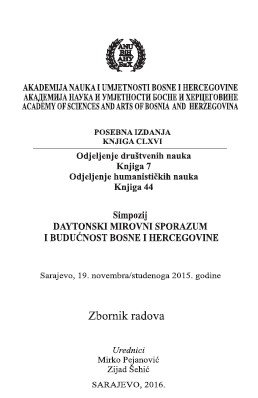
In this article, the authors give arguments to develop the thesis that the constitutional order of Bosnia and Herzegovina ignores the government’s financial sovereignty, and conclude that Bosnia and Herzegovina is fiscally sovereign as much as a confederation. In the centre of economic and political-legal debate on the statehood of Bosnia and Herzegovina are different approaches to the allocation of responsibilities between the state and its entities, and approaches to organization of government. In this discussion, the dominant question is whether Bosnia and Herzegovina can be considered a federation or a confederation. In the disagreement of national and political elites, the dominant conflict is based on ethno-national notions of ethnic homogeneity and national sovereignty over “own territories”. The solution for the sustainability of Bosnia and Herzegovina in this article is observed through two conceptual levels. In the first, the involvement of the international community, especially the European Union, in designing the changes of Dayton Agreement seems inevitable. According to the second, Bosnia and Herzegovina will have to reconcile the current irreconcilable differences of its national political elites on its own. In both cases, the minimum acceptable framework for all legal solutions should include the establishment of mechanisms for fiscal sustainability of Bosnia and Herzegovina, including economic-fiscal coordination between the entities and the Brcko District, protection of equal individual and collective rights, equality of the constituent peoples in the entire territory of the country, including minority rights, and the adoption and implementation of international treaties and conventions on human rights.
More...
Civil society and its consciousness must have their economic and social basis. There must be what is called “the middle class”. There is no middle class in Bosnia and Herzegovina, society is socially divided between the narrow circle of the tycoon-political oligarchy and the vast majority of impoverished people, without jobs and living at minimum of existence. Inequalities – financial and social – in Bosnia and Herzegovina are vast, and the factor that enlarges them is the present discrimination (territorial, status, marginalized groups, etc.). The absence of the middle class is one of the reasons for the lack of democracy in our country. These are not economic and social conditions that allow the development of civil society. This on the other hand are the conditions for ideological and political manipulation of national or civic identity. For important, positive changes in BiH, development of civil society is an important prerequisite, especially the awareness that government serves the citizens, and not that they “need” the government just to maintain. The best way to achieve this is to learn the lessons, change the approach, first of all through support to policies to strengthen the real private sector and the permeation of civil and national identity. This is a good recipe against nationalism and “production” of national conflicts. Regardless of – in principle – good intentions, support to the development of civil society by international organizations gave very weak results. This “glass is nearly empty.” One of the main reasons are focusing on non-governmental organizations, with the neglect of other important “sectors” of civil society – unions, religious communities, academia, etc. It seems that these have been left to the party influences and manipulations.
More...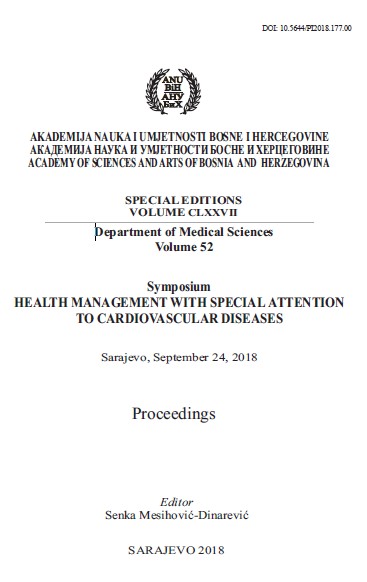
There is no doubt that the overall health of the population is the area of a special social concern of a state, hence, this concern is most often expressed through complex systems of healthcare insurance. Having in mind the fundamental social significance of the healthcare system, debates pertaining to its functioning and efficiency have been ubiquitously present all around the globe. The importance of scientific and practical research in the healthcare area are becoming particularly important in the unfavorable economic conditions as have been present in the most of the World’s countries during and after the 2007 economic crisis. Considering the severity of the crisis, many of the countries have been facing the need for a revision of their health systems in order to assure sustainability of their healthcare in newly arisen, adverse and uncertain financial reality. Additionally, although the healthcare systems can be grouped and attributed to a certain model, we must not neglect the fact that healthcare systems are different from state to state and that they are under a strong influence of history, tradition, political system, economy and national values of every state. Because of this, it has not been possible to offer a single set of universally efficient measures for tackling the crisis’ repercussions on healthcare systems. In this paper we analyze the responses implemented by European Union countries in the light of the most recent economic crisis, deemed unprecedented in the Union since its establishment.
More...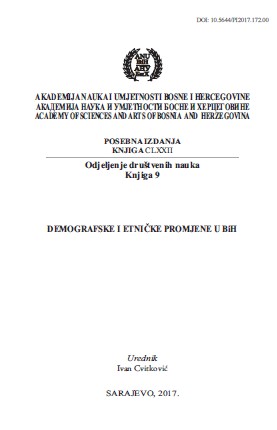
U istraživačkoj studiji o etničkoj strukturi opština u Bosni i Hercegovini prema Popisu stanovništva 1991. i 2013. godine elaboriraju se promjene u demografskoj strukturi stanovništva koje su nastale od 1991. do 2013. godine. Posebna pažnja daje se promjeni etničke strukture stanovništva po Popisu stanovništva 2013. godine. Jedinica posmatranja promjene etničke strukture stanovništva jeste opština kao osnovna teritorijalna – samoupravna jedinica u kojoj žive stanovnici jedne zemlje. Komparacija etničke strukture opština po Popisu stanovništva 1991. sa etničkom strukturom po Popisu stanovništva 2013. je pokazala da je došlo do radikalne promjene etničke strukture u opštinama Bosne i Hercegovine. Prema Popisu stanovništva Bosne i Hercegovine 2013. godine dvije trećine opština imaju jednonacionalnu strukturu u postotku od 70% do 99%. Ovakve promjene etničke strukture uslovljene su politikom nasilnog etničkog čišćenja u vremenu rata i preovladavajućim uticajem etničkih stranaka u vršenju vlasti u postdejtonskom periodu. Etnička homogenizacija stanovništva ostvarena u vremenu rata 1992–1995. odvija se i u miru kao etnička teritorijalizacija. Etnička teritorijalizacija prostora ima svoju osnovu u etno-politikama jednonacionalnih stranaka. Usljed takvog društvenog kretanja na prostoru Bosne i Hercegovine oblikovana su područja s dovršenom etničkom teritorijalizacijom. Ona se javljaju u vidu Republike Srpske za Srbe, zatim u vidu pet kantona za Bošnjake: Tuzlanski, Unsko-sanski, Sarajevski, Zeničko-dobojski i Bosansko-podrinjski. Za hrvatski narod kao etnički teritorijalizirani prostor iskazuje se u: Zapadno-hercegovačkom, Hercegbosanskom i Posavskom kantonu. Višenacionalna struktura stanovništva održana je u gradu Mostaru, Distriktu Brčko i opštinama: Jajcu, Bosanskom Petrovcu, Vukosavlju, Jezeru, Donjem Žabaru, Gornjem Vakufu, Pelagićevu, Žepču i Busovači.
More...